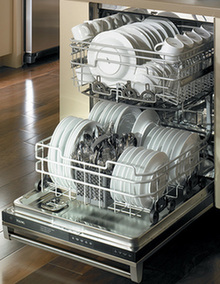Tips for Green Dishwashing
When it comes to washing dishes, you might guess—and you probably wouldn’t be alone—that it is more environmentally friendly to wash by hand than by machine. But that may not necessarily be the case, depending on the dishwasher.

A study by German researchers at the University of Bonn showed that modern machine dishwashers can actually use as little as half the energy, a sixth of the water, and even less soap than the average fill-up-the-sink-and-roll-up-your-sleeves technique.
Either way, roughly 20 per cent of the water you use is in your kitchen, and most of that cleans your dishes. Bear these few tips in mind, and you’ll avoid putting unnecessary drain-strain on the planet.
If you’re using a dishwasher, always run—as with laundry—full loads. If you have a low-heat air-dry option, use it. It works just as well and saves energy. If your dishwasher doesn’t come with that option, you can simply shut the machine off after the final rinse and let it drip dry, with the door open.
If you’re washing by hand, use as little water as possible. You don’t need to fill the sink; halfway, or even less, in most cases, will do. And don’t leave the tap running while you’re at it … just give it a quick (and gentle) burst each time you need a rinse.
When choosing soaps and detergents, whether for the sink or the dishwasher, look for all-natural brands—like Nature Clean or Ecover, just to name a couple. Natural soaps are cheaper and more widely available than ever before, and won’t poison your local lakes and rivers.
(中國(guó)日?qǐng)?bào)網(wǎng)英語(yǔ)點(diǎn)津 編輯)